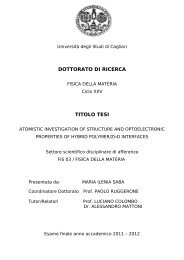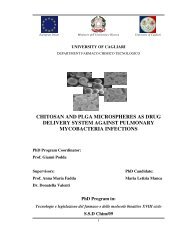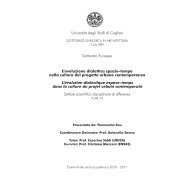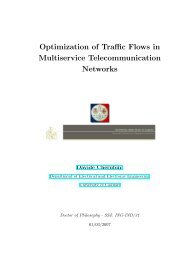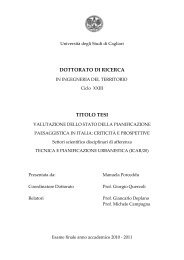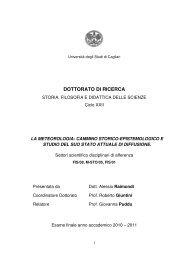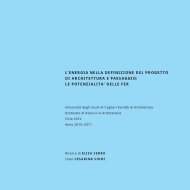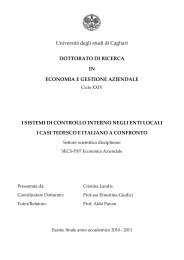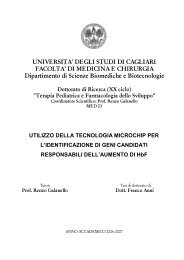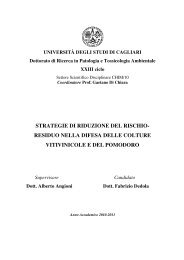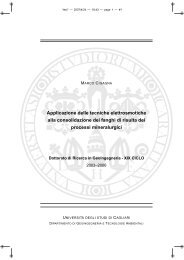The only truly alien planet is Earth. - UniCA Eprints - Università degli ...
The only truly alien planet is Earth. - UniCA Eprints - Università degli ...
The only truly alien planet is Earth. - UniCA Eprints - Università degli ...
You also want an ePaper? Increase the reach of your titles
YUMPU automatically turns print PDFs into web optimized ePapers that Google loves.
all’epoca era rivolta verso la ricerca del proprio ‘vero sé’ che m<strong>is</strong>tic<strong>is</strong>mo orientale e cultura<br />
l<strong>is</strong>ergica parevano permettere di raggiungere e far emergere. 127<br />
Uno <strong>degli</strong> slogan più famosi della controcultura psichedelica era “turn on, tune in, drop out”,<br />
coniato dal guru del LSD Timothy Leary. Lo stesso Leary raccolse in seguito sotto questo titolo una<br />
raccolta di saggi riguardanti, tra le altre cose, Aldous Huxley - nel suo Brave New World troviamo<br />
una droga chiamata ‘soma’ -, la neurologia e le droghe psichedeliche. Negli anni in cui la cultura<br />
dell’LSD era al suo apice Ballard volle sperimentarla personalmente. Accadde una volta sola, ma<br />
gli fu utile per dare alla v<strong>is</strong>ionarietà che caratterizza <strong>The</strong> Crystal World e <strong>The</strong> Unlimited Dream<br />
Company una connotazione dec<strong>is</strong>amente psichedelica. Non sorprende peraltro che, in funzione di<br />
quella costruzione mitologica dello ‘scrittore Ballard’ come personaggio della vita reale, notata<br />
dalla Oramus e da altri studiosi, l’autore abbia rilasciato in alcune interv<strong>is</strong>te dichiarazioni<br />
contrastanti quanto alla data e all’impatto della sua esperienza con l’LSD.<br />
Correttamente Stephenson individua un legame comune tra Ballard, Laing e Huxley in<br />
relazione al rapporto tra l’io conscio e un sé più profondo. Ballard condivide con lo psichiatra l’idea<br />
che ognuno di noi abbia atteggiamenti ambivalenti r<strong>is</strong>petto alla propria identità individua le e quella<br />
sociale 128 ; con l’autore di Brave New World l’idea che es<strong>is</strong>tano diversi livelli di consapevolezza 129 .<br />
Emblematica, per quanto riguarda la concezione della follia di Laing, la paradossale affermazione<br />
di un personaggio di Running Wild, secondo il quale «in a totally sane society, madness <strong>is</strong> the <strong>only</strong><br />
freedom» [p. 84]. Gli stati alterati di coscienza sono strettamente connessi ad alcune forme di<br />
creatività, tra le quali il sogno e la scrittura automatica, ma anche la follia e il delirio, nel<br />
J. G. Ballard’, in Vale and Juno (a cura di), Re/Search, pp. 42-52, p. 45].» Jeannette Baxter, J. G. Ballard’s Surreal<strong>is</strong>t<br />
Imagination, op. cit., p. 28.<br />
127 «[R.D.] Laing in fact writes more sympathetically of Jung’s therapeutic technique and Jung’s conception of the<br />
psychic apparatus <strong>is</strong> indeed more “affirmative” than Freud’s. Without any apparent theor<strong>is</strong>ation of a bar of repression<br />
between conscious and individual unconscious, and without any sense of the foundational necessity [corsivo<br />
dell’autore] of the unconscious for the constitution of subjectivity, the process of individuation <strong>is</strong> simply a union which<br />
arrives at the (re)possession of the Self, the completely self-knowing, self-intending apocalyptic consciousness. Th<strong>is</strong><br />
can be connected, in inadequate shorthand, to the process of “tuning in”, establ<strong>is</strong>hing a relation to the <strong>alien</strong>ated inner<br />
self as that “true self” suppressed by Western culture, that so dominated the Sixties “regime of truth”.» R. Luckhurst,<br />
op. cit., p. 359.<br />
128 «<strong>The</strong> ego, according to Laing, <strong>is</strong> a self-validating but <strong>only</strong> very partial and limited mode of consciousness. […] we<br />
repress and res<strong>is</strong>t the Self, or our inner identity, while desperately cultivating the ego, our instrument for adapting to the<br />
external world. […] Again, like Jung, Eliade, and Campbell, Laing views the evolutionary direction of consciousness as<br />
that of a movement from ego to Self, from the illusion of “identity-anchored, space-and-time-bound experience” [<strong>The</strong><br />
Politics of Experience, p. 96], to the experience of transcendence. One way of accompl<strong>is</strong>hing th<strong>is</strong> journey, especially in<br />
the context of our secular, material<strong>is</strong>tic culture, <strong>is</strong> to go mad. Madness, Laing observes, “need not be all breakdown. It<br />
may also be break-through”[ivi, p. 93]. <strong>The</strong>re are some striking parallels between the writing of Laing and that of J.G.<br />
Ballard. Both share the notion that we are profoundly ambivalent with regard to our individual identities and our<br />
collective social identity, that we are clinging determinedly, apprehensively, to an illusion while at the same time forces<br />
within our psyches are working to overturn that illusion. Both writers also share the belief that “breakdown” and<br />
“break-through” are inextricably intertwined […].» G. Stephenson, op. cit., p. 7.<br />
129 «Beyond ego-identity, according to Huxley, there are higher, larger degrees of awareness, including what he calls the<br />
“not-I”, which possesses “a greater power and a completer knowledge” than the ego-mind, as well as other unknown<br />
modes of consciousness that ultimately are identical with Universal Mind.» Ivi, p. 8.<br />
- 42 -



